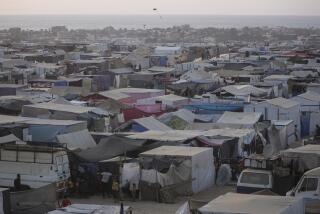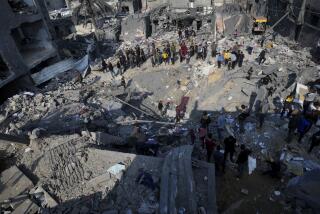Bush Assails Iraqi ‘Myths and Falsehoods’
- Share via
WASHINGTON — President Bush complained angrily on Tuesday of Baghdad’s “one-sided propaganda machine cranking out a lot of myths and falsehoods” as concern mounted that public opinion may be influenced by reports of civilian casualties and urban damage.
“I don’t think the world is buying it,” Bush asserted.
Still, the Administration’s moves to quickly counter Iraqi President Saddam Hussein’s allegations reflect concern that public support could be jeopardized if the charges go unchallenged.
“It doesn’t look serious yet, but you don’t want to wake up in two weeks and find out it’s run away from you and public support has evaporated. Is it a serious problem now? No. Would it be if he’s allowed a free hand? Yes,” a senior White House official said.
The official, speaking on the condition of anonymity, described Bush’s remarks as a calculated “preemptive strike on a nascent problem that could get out of control.”
He added, “We’re jumping on things at the first sign of trouble.”
Iraqi Religious Affairs Minister Abdullah Fadel has said in Baghdad that the war has left thousands of civilian casualties--substantially more than the previously reported figure of 650 civilians killed and 750 wounded. The numbers have not been independently verified.
The war, said Najif Hadithi, director general of the Iraqi Information Ministry, is “a systematic campaign by the United States to destroy Iraq. These are deliberate attacks on the city (of Baghdad) with intention to kill people in Iraq.”
As the war enters its fifth week, the Administration appears to be trying to deal aggressively with the challenge of chewing up the Iraqi military machine from the air without losing any political battles at home or abroad. Officials in Washington acknowledged that the pressure of public opinion is being felt.
“There’s a certain urgency (to begin the ground campaign) because the degree of support you enjoy now is not going to hold on forever--internationally or domestically. You have a much better chance of holding things together if you move quickly,” a senior White House official said.
The official said that in the future, the Administration will move as quickly as possible to respond to negative publicity, whether reports of civilian casualties or weapons failures, before they can damage public support.
Referring to the selective release by the Pentagon of video images of laser-guided bombs hitting their targets just as planned, he said, “If there are charges of indiscriminate bombing, the Pentagon puts out all those pictures of smart bombs. It does the PR (public relations) job.”
One day after White House Press Secretary Marlin Fitzwater suggested that even Soviet President Mikhail S. Gorbachev had been taken in by Iraqi insistence that allied attacks have been aimed at civilian facilities, Bush said of Hussein:
“I think there’s a conscientious effort on his part to try to raise the propaganda value of accusing us of indiscriminately bombing civilians. And it’s simply not true.
“What’s overlooked is a lot of the brutality that’s so evident and so purposeful on his part: the treatment of the prisoners, the Scud missile attacks that have no military value, the environmental terrorism. It’s not taken human lives yet, but it’s pretty bad,” the President said.
“Environmental terrorism” was a reference to the apparently deliberate spilling of at least 11 million gallons of crude oil into the Persian Gulf, which the allies blame on Iraq.
Bush met Tuesday afternoon with French Defense Minister Pierre Joxe and then with the British defense minister, Tom King. Afterward, they each offered public endorsements for the U.S. position that before a ground attack is launched, pilots need to inflict more bombing damage to Iraq’s communications systems, transportation network, weapons and troops.
“We need to reduce the number of tanks, of artillery pieces, of armored personnel carriers; we need to reduce the ammunition stocks . . . damage the command and control network . . . (and) make sure that we sever the lines of communication,” King said. “I think that process has still a little way to go before we can be confident of success in the land campaign with the minimum of casualties.
“We have a duty to our own servicemen to see that it is done in a way most likely to reduce casualties of our own forces,” he said.
After meeting with Defense Secretary Dick Cheney and Gen. Colin L. Powell, chairman of the Joint Chiefs of Staff, Bush said Monday that the campaign of raining bombs, cruise missiles and shells onto Iraqi positions “will continue for awhile.”
King said he agreed with this approach.
Calling for “some significant reduction in Iraq’s military capability,” King said:
“We want to see a tilt in the balance of military advantage so that when our (land) forces embark . . . the balance of advantage is with them. That will help us to minimize the casualties on our own side and actually, hopefully, minimize the casualties for the people of Kuwait who are going to be part of the battleground.
“I think there’s some work to be done,” he added.
As if reading from the same script--and one prepared with the White House’s concerns in mind--Joxe and King rejected suggestions that the allied bombing campaign against Baghdad and other Iraqi cities exceeds the United Nations mandate to force Iraq to end its occupation of Kuwait. Gorbachev had charged Saturday that the massive bombing may end up exceeding that mandate.
Both visitors said in separate news conferences that some civilian damage is lamentable but unavoidable.
“In any war . . . there is always the risk of civilian damage,” Joxe said. “This is a problem that cannot be avoided. The one that is responsible for the conflict by invading a neighboring country is implicated in this civilian damage.”
He said that Hussein “could end the bombing any time” by unconditionally withdrawing his troops from Kuwait.
Joxe said he discussed the timing of the start of the ground campaign with Bush and Cheney, but he refused to provide any details. He reaffirmed that once the ground war begins, French troops “will fight beside an American division.”
Although Joxe said Washington and Paris agree in their approach to the war, he indicated the two might have differences on restoring peace.
He said France is increasingly convinced that the West must make renewed efforts to settle such nagging problems as the Arab-Israeli conflict once the war ends.
Bush and other U.S. officials agree that the Arab-Israeli conflict must be addressed, but they reject any “linkage” to the Gulf War, out of concern that such an approach might appear to give Hussein a diplomatic victory.
Joxe said France is prepared, without conditions, to help rebuild Iraq following the war. He went far beyond Secretary of State James A. Baker III, who said last week that the United States and its allies should help restore Iraq--if Hussein is deposed and the war ends without especially bloody ground fighting.
More to Read
Get the L.A. Times Politics newsletter
Deeply reported insights into legislation, politics and policy from Sacramento, Washington and beyond. In your inbox twice per week.
You may occasionally receive promotional content from the Los Angeles Times.










